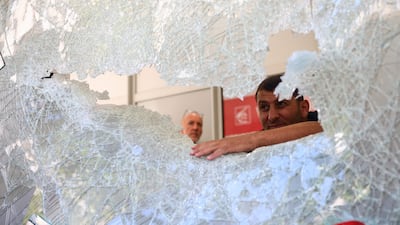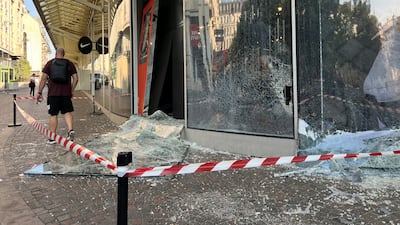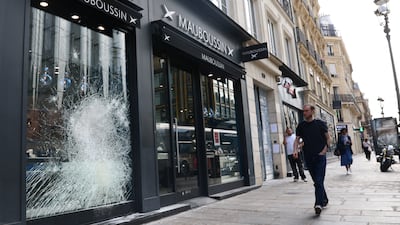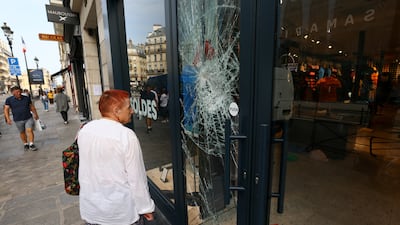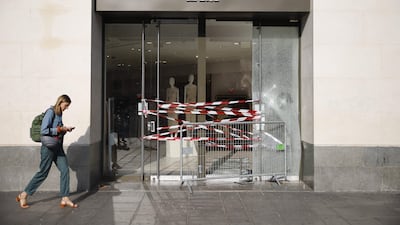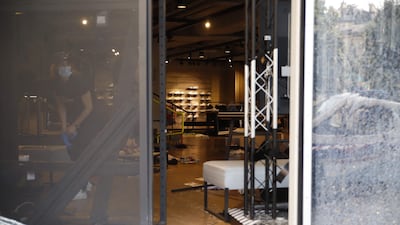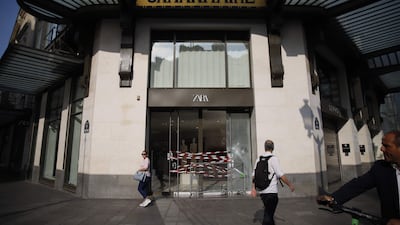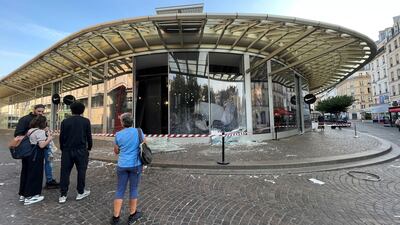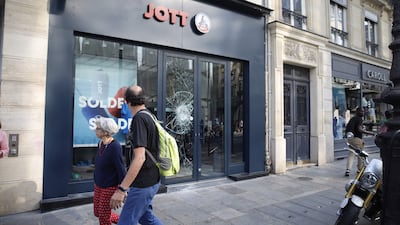At a small dry cleaner’s shop in an eastern Paris suburb, Evelyne irons a pair of trousers.
Clients call or stop by to check whether they are open.
“We’re still standing!” answers Evelyne, a tall woman with light-blue eyes.
The inside of her shop, which she runs with her husband Eric, is obscured by large wooden panels that cover the damage done during three nights of looting last week.
Many cracks are visible through the windows, but looters failed to open the front door.
That was not the case at many neighbouring businesses that remained shut on Monday with their facades boarded up and their insides emptied.
Like other French cities, looters went on a rampage in Montreuil, a quiet suburb 2km outside Paris on Wednesday, shortly after a police officer’s fatal shooting at a traffic stop of Nahel M, a teenager of North African origin whose full name has been withheld.
“It was like a bomb had gone off,” said Eric, who says he is still astounded by the relentless “gratuitous” violence shown by looters against the neighbouring hairdresser’s.
“They ripped out water pipes and mirrors. They stole nail varnish and hair products. They were looting for the sake of looting.”
About 45,000 officers were deployed nationwide due to the violence on Monday. French President Emmanuel Macron asked the interior ministry to maintain a “massive presence” of security forces on the ground so that “calm can return”.
In all, according to the ministry, there were 157 arrests overnight out of a total of 3,354 since last Tuesday, and two law enforcement stations were attacked, among other damage.
The Interior Minister said the average age of those arrested was 17 and that children as young as 12 or 13 had been detained for attacking law enforcement and setting fires.
The intensity of the riots has decreased in the past days, but the political storm about how to handle the root causes of the violence witnessed in France since Nahel M's killing continues.
The political class is sharply divided between those who argue that successive government policies are responsible for increasing poverty and social exclusion, and those who call for a harsher police response.
The UN on Friday called on France to examine “serious racism problems” within its security forces.
The attack against the house and family of a mayor of a Paris suburb in the early hours of Sunday further raised fears among elected officials for their physical safety.
The association of France's mayors called for a sit-in in front of town halls across the country at midday on Monday.
In all, 99 town halls have been attacked in the violence, along with other public buildings, according to the interior ministry.
In Nanterre, where Nahel M was killed, Mayor Patrick Jarry said that violence “penalises first and foremost the youth and families in our neighbourhoods”.
“We must not confuse a revolt, which can be legitimate after the tragedy that there was, and exactions which have strictly nothing to do with it,” president of the National Assembly Yael Braun-Pivet told local television on Monday.
‘Baffling’
Many cities like Montreuil, a working-class suburb of Paris of 110,000, had not witnessed such levels of violence in decades.
“It's baffling,” retired post office employee Gilbert Lefevre, 67, told The National. “It's got nothing to do any more with the death of Nahel.
“These kids seem to think they're playing a video game, with the aim of looting as much as possible.”
Videos of the seemingly senseless ransacking of shops have gone viral on social media, including one that shows hooded young men telling one another to “take the mascarpone for the tiramisu” as they break into a shop.
Montreuil houses a large immigrant population from West Africa and also attracts middle-class Parisians seeking lower rents than in the capital.
Yet it also has managed to evade large-scale riots seen in the past decades, including those in 2005 that were accompanied by looting.
This is due in part to its left-wing leadership – the current mayor, Pierre Bessac, is a member of the Communist Party – which has focused in the past decades on supporting the integration of migrants and renovating social housing projects, according to town hall sources.
Property developers must include 40 per cent of social housing in any new project, way above the 25 per cent required by law, to prevent lower-income populations from living in pockets of poverty.
Reports of attacks against charity organisations, including the torching of a bus that offered free medical services in the suburb of Bobigny on Wednesday, are also seared into many people's minds.
“They're attacking services for poor people,” said Mr Lefevre.
“My fear is that these young people won't receive harsh enough sentences. They'll be let out because they're minors and then they'll start again.”
Marie, a woman in her seventies who owns a bakery near Montreuil's town hall, said that she heard the looters as they broke into her shop in the early hours of Thursday.
“I live upstairs,” she said.
She stayed up all night but did not go downstairs as she feared being physically hurt.
“I didn't come down until the next morning when I cleaned all the broken glass on my own,” she said.
She reopened the bakery on Friday.
“It's a shock. I've been here for 25 years,” she said. “I guess the riots were everywhere, so why not Montreuil?
She added that they took the cash register, pointing at a space next to the croissants and chocolate rolls on sale.
“There were just a few cents in there,” she said. “This must stop.”
